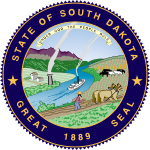1996 United States Senate election in South Dakota
 From Wikipedia - Reading time: 10 min
From Wikipedia - Reading time: 10 min
| |||||||||||||||||
| |||||||||||||||||
 County results Johnson: 50–60% 60–70% 70–80% 80–90% Pressler: 50–60% 60–70% 70–80% | |||||||||||||||||
| |||||||||||||||||
| Elections in South Dakota |
|---|
 |
The 1996 United States Senate election in South Dakota was held on November 4, 1996. Incumbent Republican U.S. Senator Larry Pressler ran for re-election to a fourth term, but was narrowly defeated by Democratic nominee Tim Johnson by 9,000 votes. Pressler was the only incumbent Senator to lose reelection in the 1996 election cycle, of which this was the only Democratic flip.[1][2] Pressler later ran again unsuccessfully for this seat in 2014 as an Independent.
General election
[edit]Candidates
[edit]- Tim Johnson, U.S. Representative at-large (Democratic)
- Larry Pressler, incumbent U.S. Senator (Republican)
Campaign
[edit]The race between Larry Pressler and Tim Johnson was one of the most competitive Senate races that year. From the onset, Johnson was seen as a potential candidate,[3] and it was thought Pressler would face a tough race were Johnson, the state's sole congressman since 1987, to enter.[4] Initially Johnson was quiet on his 1996 plans[5] but after a delay due to his wife's breast cancer surgery,[6] Johnson formally entered the race on April 2, 1996.[7] Neither candidate faced any primary opposition.[8]
One of the biggest issues of this campaign had to do with Pressler, the chair of the Senate Commerce Committee, and his increased stature. For example, Pressler received criticism for his suggestions to privatize public television.[9] He also faced criticism for enquiring the ethnic background and gender identity of PBS employees.[10] The backlash from the situation also led to bumper stickers saying "Keep public TV, privatize Pressler" popping up around the state.[11] Another issue which would arise was related to the Telecommunications Act of 1996 a bill which Pressler authored.[12] Johnson used the bill to attack Pressler for rising phone prices in South Dakota. This especially became a problem when Pressler had to pull an ad claiming phone rates went down, even though they had not.[1] More challenging for Pressler, however, were the attacks relating to PAC donations Pressler received.
Pressler received significant donations from telecommunication entities and their Political Action Committees.[4] In the first nine months of 1995, Pressler received more PAC donations than any other politician.[13][14] In a small state such as South Dakota, this meant the money could be spent on numerous ads.[8] That said, this proved a double edged sword for Pressler. Johnson criticized Pressler for the donations he took from these companies and tied the donations to the Telecom bill.[15] Similarly, on tobacco donations, Pressler faced criticism for accepting over $50,000 in money from the tobacco industry, whereas Johnson had stopped accepting donations in 1995.[16] This, coupled with allegations of Pressler using campaign funds for lavish travel, fed into Johnson's attacks that Pressler lost touch with the state's voters.[17][18]
Johnson had faced the advantage of being the states lone U.S. House member, which some believe put him on an even keel with Pressler, and created the dynamic of an incumbent against another incumbent.[17] Johnson also had a better record of winning, never getting less than 59% of the vote in his five campaigns and over performing Pressler on the same ballot in 1990.[19][15] Pressler tried to attack Johnson's record charging that he was too liberal for voters of South Dakota.[18][1] Pressler ran numerous ads, starting in July 1995, attacking Johnson as a liberal, though Johnson's campaign's polling showed these attacks did not land.[20]
In terms of polling, it was seen as a close race throughout, albeit mostly through internal polls.[18][1] In the end, Johnson was the victor of a close race, in spite of being outspent 8 to 5.[21]
Results
[edit]| Party | Candidate | Votes | % | ±% | |
|---|---|---|---|---|---|
| Democratic | Tim Johnson | 166,533 | 51.32% | +6.25% | |
| Republican | Larry Pressler (incumbent) | 157,954 | 48.68% | −3.71% | |
| Total votes | 324,487 | 100.00% | N/A | ||
| Democratic gain from Republican | |||||
See also
[edit]References
[edit]- ^ a b c d "AllPolitics - South Dakota Senate Race - Nov. 6, 1996". CNN. November 16, 2004. Archived from the original on November 16, 2004. Retrieved August 15, 2023.
- ^ Barrett, R. Morris (November 6, 1996). "AllPolitics - A Status Quo Senate - Nov. 6, 1996". www.cnn.com. Archived from the original on October 5, 2001. Retrieved August 30, 2023.
- ^ Curran, Tim (November 20, 1994). GOP licking chops over '96 prospects. Times Daily. pp. D1.
- ^ a b Brasher, Phillip (August 6, 1995). Phone PACS aids bill's sponsor. Rome News-Tribune. pp. 2E.
- ^ Lawrence, Tom (December 16, 2014). "Lawrence: Tim Johnson's graceful exit from the Senate". Aberdeen News. Archived from the original on August 29, 2023. Retrieved August 29, 2023.
- ^ Espo, David (March 4, 1996). Democrats grow optimistic over Senate races. The Daily Gazette. pp. A5.
- ^ Kranz, David (April 3, 1996). "Johnson says he'll fight for S.D. values in Senate". Argus-Leader. p. 1. Retrieved February 28, 2024.
- ^ a b Rosenbaum, David E. (October 19, 1996). "A Rare Sighting in South Dakota: An Incumbent in a Battle for Re-election". The New York Times. ISSN 0362-4331. Archived from the original on November 13, 2013. Retrieved August 29, 2023.
- ^ Anderson, Jack; Binstein, Michael (August 29, 2023). "PRESSLER AND THE BARNEY' BACKLASH - The Washington Post". Washington Post. Archived from the original on August 29, 2023. Retrieved August 29, 2023.
- ^ Witt, Karen de (February 3, 1995). "Queries on Public Radio Staff Start Furor". The New York Times. ISSN 0362-4331. Archived from the original on May 26, 2015. Retrieved August 29, 2023.
- ^ Marks, Alexandra (September 20, 1995). "PBS Is Bowed But Unbroken In Budget Battle". Christian Science Monitor. ISSN 0882-7729. Archived from the original on September 26, 2015. Retrieved August 29, 2023.
- ^ Shribman, David (September 23, 1996). Contentious Senate Campaign in South Dakota. Lawrence Journal-World. pp. 6B.
- ^ L'Hommedieu, Jon (May 29, 1996). 'Clean up Congress' means getting rid of PAC funds. The Daily Courier. pp. 4A.
- ^ "Washingtonpost.com: Contributions On Call". The Washington Post. August 29, 2023. Archived from the original on August 29, 2023. Retrieved August 29, 2023.
- ^ a b Schantz, Harvey L. (May 13, 2013). Politics in an Era of Divided Government. Routledge. doi:10.4324/9780203903155. ISBN 978-1-135-57766-7.
- ^ Neergaard, Lauran (September 5, 1996). "NEWSPAPER ADS SUPPORT FDA'S TOBACCO CRACKDOWN". Greensboro News and Record. Archived from the original on August 29, 2023. Retrieved August 29, 2023.
- ^ a b Associated Press (September 23, 1996). South Dakota senator in peril of losing seat. The Southeast Missourian. pp. 4A.
- ^ a b c Dewar, Helen (October 20, 1996). "NO MORE MR. NICE GUYS IN SOUTH DAKOTA". Washington Post. ISSN 0190-8286. Archived from the original on August 28, 2017. Retrieved August 30, 2023.
- ^ Lowy, Joan (October 13, 1996). Control of the Senate appears too close to call. Reading Eagle. pp. A20.
- ^ Struble, Karl (2000). Campaigns and elections: contemporary case studies. Washington (D.C): CQ press. p. 67. ISBN 978-1-56802-495-0.
- ^ Slavin, Peter; Gallman, Vanessa (November 5, 1996). Incumbency helps congressional candidates. Lakeland Ledger. pp. A17.
- ^ "Election Resources: South Dakota Secretary of State".
 KSF
KSF
